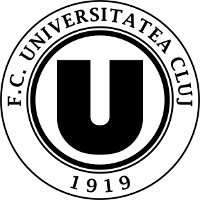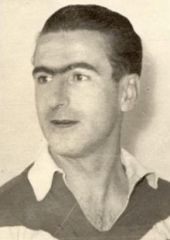Related Research Articles

Asociația Sportivă Fotbal Club Universitatea Cluj, commonly known as Universitatea Cluj or simply as U Cluj, is a Romanian professional football club based in the city of Cluj-Napoca, Cluj County, that competes in the Liga I.

Ioan "Neluțu" OvidiuSabău is a Romanian professional football manager and former player, currently in charge of Liga I club Universitatea Cluj.

Titus Ozon was a Romanian international football striker and manager. He was considered one of the greatest talents of the postwar in the Romanian football, famous for his extraordinary ability to dribble.

Mihai Adam was a Romanian football player who played as a striker.
Septimiu Câmpeanu is a Romanian retired football striker and manager.

Zoltán "Zoli" Ivansuc was a Romanian footballer who played mainly as a forward for Universitatea Cluj.

Constantin Rădulescu, commonly known as Dr. Constantin Rădulescu, was a Romanian doctor, footballer and manager. As a footballer he played mainly as a midfielder.

Asociația Fotbal Club Progresul Spartac 1944 București, commonly known as Progresul Spartac București or simply as Progresul Spartac, is a Romanian professional football club based in Bucharest, that competes in the Liga II.
Remus Câmpeanu was a Romanian footballer who played as a left-back for Universitatea Cluj.
Dan Sabin Anca was a Romanian football midfielder and manager for Universitatea Cluj.
Traian Georgescu was a Romanian football defender who spent his entire career at Universitatea Cluj. He was "U" Cluj's captain when the club won the 1964–65 Cupa României.
Mircea Luca was a Romanian football defender, manager and president at Universitatea Cluj.
Petre Cădariu was a Romanian footballer who played as a forward. He scored the only goal of the 1958 Cupa României final against Progresul București, which helped Politehnica Timișoara win the first trophy in the club's history. In 2008 Cădariu received the Honorary Citizen of Timișoara title.
Vasile Gain was a Romanian football midfielder and a manager.
Constantin Ștefan was a Romanian footballer who played as a left back.
Nicolae Szoboszlay was a Romanian football goalkeeper and manager.
Petre Moldoveanu was a Romanian footballer and manager. On 21 November 1948 he played in the first ever CSCA București – Dinamo București derby. He scored the first goal in the 2–1 victory against CSU Cluj in the 1949 Cupa României final, which helped CCA București win the first Cupa României in the club's history.
Călin Andrei Zanc was a Romanian footballer who played as a defender. He died at age 43 in a road accident, after the driver of the car he was on lost control of the vehicle and crashed into a fence in Jichișu de Jos.
Nicolae Cornel Ilea is a retired Romanian football striker. He scored the only goal of the 1994 Cupa României final against FC Universitatea Craiova, which helped Gloria Bistrița win the first trophy in the club's history.
Ștefan Cârjan was a Romanian football left winger and manager.
References
- 1 2 3 4 5 6 Sever Coracu at RomanianSoccer.ro (in Romanian)
- ↑ Sever Coracu at National-Football-Teams.com
- ↑ Sever Coracu at WorldFootball.net
- ↑ "Progresul Spartac și Universitatea Cluj-Napoca, "derby-ul pribegiei"" [Progresul Spartac and Universitatea Cluj-Napoca, the "derby of runaways"] (in Romanian). Romanialibera.ro. 26 September 2018. Retrieved 12 March 2020.
- 1 2 3 "Fotbaliști care au evoluat sub tricolor, dar s-au născut în afara granițelor României" [Footballers who evolved under the tricolor, but were born outside the borders of Romania] (in Romanian). Prosport.ro. 13 March 2009. Retrieved 14 March 2020.
- 1 2 3 "Istoric atletism" [History of athletics] (in Romanian). U-cluj.ro. Retrieved 14 March 2020.
- 1 2 3 4 5 "Alfred Eisenbeisser to Bondoc Ionescu-Crum: Romanian legends who excelled in multiple sports". Fifa.com. 15 May 2023. Retrieved 1 July 2023.
- 1 2 3 4 5 6 7 8 9 10 11 12 13 14 "Sever Coracu" (in Romanian). 4everucluj.ro.
- ↑ "Universitatea Cluj 1939–40 season" (in Romanian). 4everucluj.ro.
- 1 2 3 4 5 6 7 "Viața și moartea doctorului Luca. Citește emoționanta și incredibila poveste a ultimului simbol al lui "U"" [The life and death of Dr. Luca. Read the exciting and incredible story of the last symbol of "U"] (in Romanian). Clujeanul.gandul.ro. 29 July 2008. Archived from the original on 1 January 2020. Retrieved 1 January 2020.
- 1 2 "Romanian Cup – 1941–1942". RomanianSoccer. Retrieved 18 March 2024.
- ↑ "Universitatea Cluj 1940–41 season" (in Romanian). 4everucluj.ro.
- ↑ "Universitatea Cluj 1941–42 season" (in Romanian). 4everucluj.ro.
- 1 2 "Romanian Cup – 1948–1949". RomanianSoccer. Retrieved 18 March 2024.
- 1 2 "Sever Coracu". European Football. Retrieved 12 March 2020.
- ↑ "Yugoslavia - Romania 1:2". European Football. Retrieved 12 March 2020.
- ↑ "Albania - Romania 1:0". European Football. Retrieved 12 March 2020.